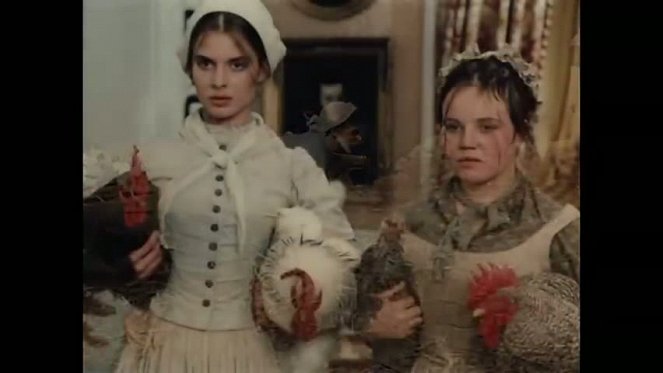Regie:
Roman PolańskiMusik:
Philippe SardeBesetzung:
Nastassja Kinski, Peter Firth, Tom Chadbon, Leigh Lawson, Richard Pearson, Suzanna Hamilton, John Barrett, Pascale de Boysson, Arielle Dombasle (mehr)Streaming (1)
Inhalte(1)
England, Ende des 19. Jahrhunderts: Tess (Nastassja Kinski), die Tochter einer verarmten Familie, verliebt sich in den Pfarrerssohn Angel (Peter Firth). Doch das Glück ist von kurzer Dauer: Tess hat eine nicht ganz ungetrübte Vergangenheit, von der Angel erst nach ihrer Hochzeit erfährt. Im viktorianischen England des 19. Jahrhunderts leben die verarmten Durbeyfields. Als der ständig betrunkene Familienvater John vom Dorfpfarrer erfährt, dass seine Familie von den reichen d'Urbervilles abstammt, schickt er seine älteste Tochter Tess auf deren Hof: Sie soll bei den reichen Verwandten Geld verdienen. Tess wird von ihrem Cousin Alec d'Urbervilles empfangen, der sogleich Gefallen an dem hübschen Mädchen findet. Sie weist das Drängen des verliebten Mannes jedoch zurück - und wird schließlich von ihm vergewaltigt. Das unerfahrene Dorfmädchen flieht zurück nach Hause und bringt dort ein uneheliches Kind zur Welt, das kurz darauf stirbt. Tess sucht eine neue Anstellung als Landarbeiterin und trifft auf den Pfarrerssohn Angel. Als beide sich ineinander verlieben, scheint sich für das Mädchen das Blatt endlich zu wenden. Doch Angel weiß noch nichts von Tess' unglücklicher Vergangenheit, von der sie ihrem Mann erst nach der Hochzeit zu erzählen wagt. Angel fühlt sich betrogen und verlässt Tess, die aufgrund der Not ihrer Familie wieder an den reichen Alec gerät. Als der Pfarrerssohn sein Verhalten bereut und zu Tess zurückkehrt, ist es für ihr gemeinsames Glück beinahe schon zu spät. (arte)
(mehr)Kritiken (2)
The three Oscars won accurately reflect the strengths of the film. The excellent production design that transports the viewer to England in the second half of the 19th century, convincing period costumes that evoke a sense of absolute authenticity, and the traditionally reliable camera are all typical pillars of Polanski's films. This director has been one of my favorites from the beginning and I'm used to him usually piquing my curiosity and guaranteeing my attention. That is, until now... Unfortunately, the nearly three-hour runtime is noticeable. In terms of drama, the film functions significantly worse, and I would attribute that to Thomas Hardy. The classic English author wrote novels for a different time, and I admit that although I managed to decipher Russian classics in my time, I could only read Hardy with a gun pressed to the back of my head. Turning it into a three-part miniseries would have been much more suitable for adapting a novel with only minimal strong emotional scenes. Nastassja Kinski is charming, innocent, romantic, appropriately naive, and simple-minded in the role of a Victorian girl. Tess and her chosen one are portrayed by Hardy as nothing more than helpless victims of Victorian prudish official morality (of course, there was also its other side, probably never so distinctly shown anywhere as the stark difference between publicly proclaimed restraint and taboos on sex and base reality. In London at the time the novel was published, one prostitute accounted for every seven men, and it was no different in other urban centers like Manchester or Liverpool). However, from Hardy, who had a tendency to idealize society and especially the countryside, nothing else can be expected. It has never happened to me before, with Polanski, that I would even momentarily consider giving a film of his only two stars, but I was unable to watch Tess in one sitting, which speaks for itself. The film fails to evoke stronger emotions and unfolds predictably, perhaps with the exception of the completely unnecessary violent death in the inn room, which, however, seems absurd in the context of the story. In his attempt to do the best job possible, Polanski somewhat fell into the trap of film academism, but so be it, I forgive him. Overall impression: 55%.
()
Ein weiterer Thomas Hardy, bei dem ich mich erschießen wollte. Filmtherapie oder viktorianische Logik für Fortgeschrittene. Im Laufe der Zeit bin ich jedoch immer wieder auf Hardy zurückgekommen, und ich werde Tess immer durch das Prisma von Polanskis Tragödie wahrnehmen. Leider. Obwohl die Geschichte der missbrauchten Tess auch ohne die Manson-Crew von Schwachköpfen schon für eine Identitätskrise gereicht hätte.
()

